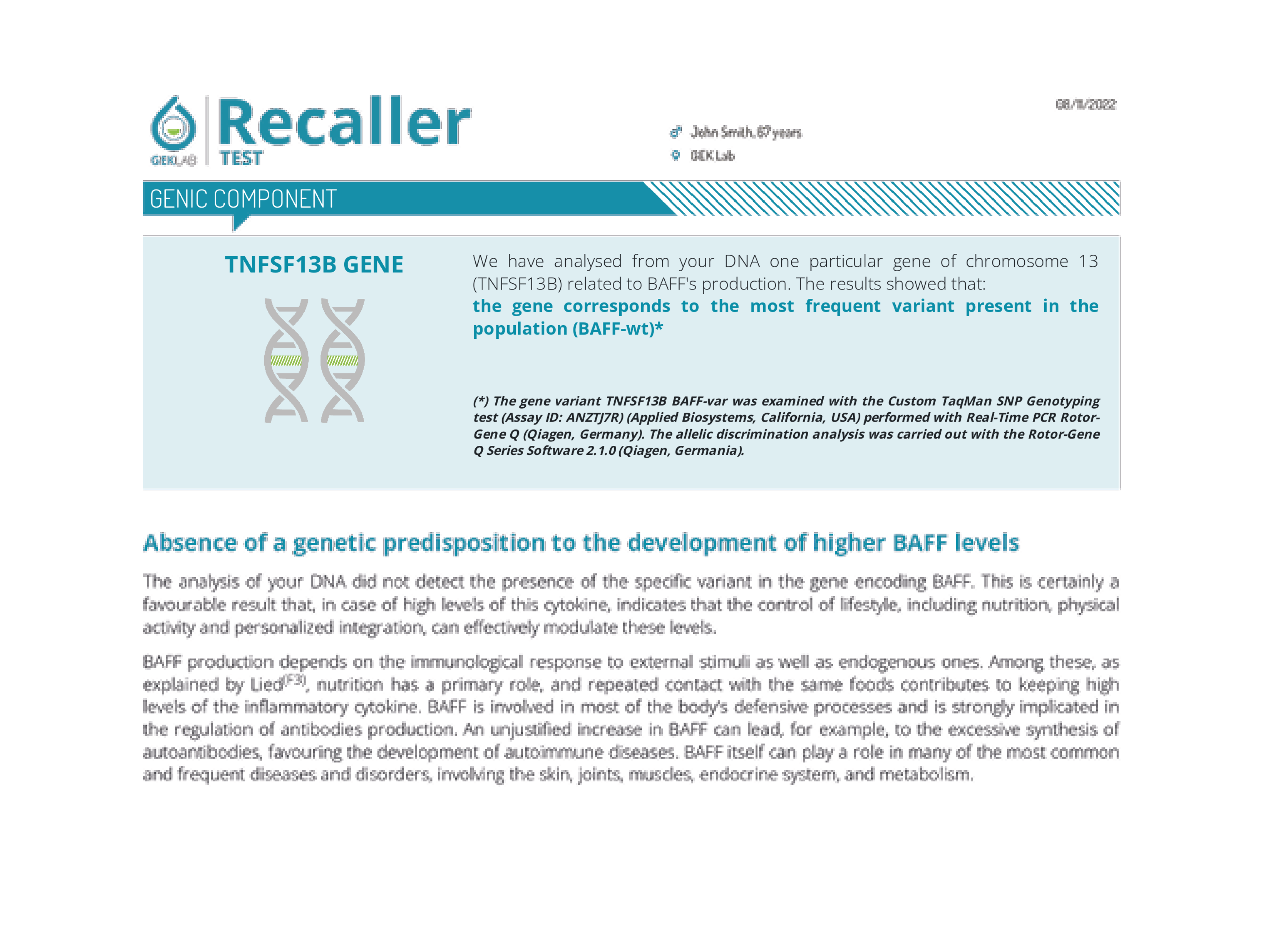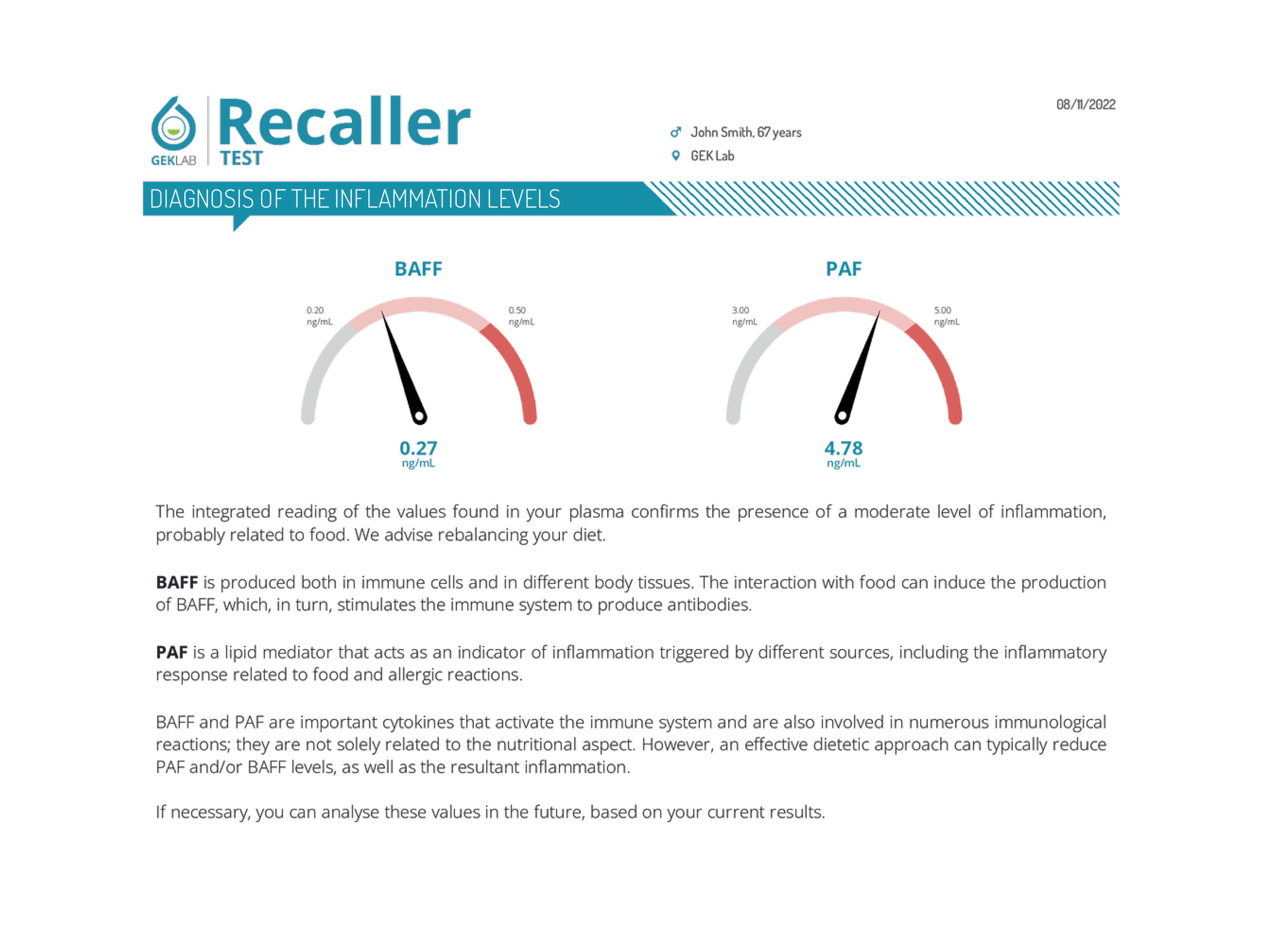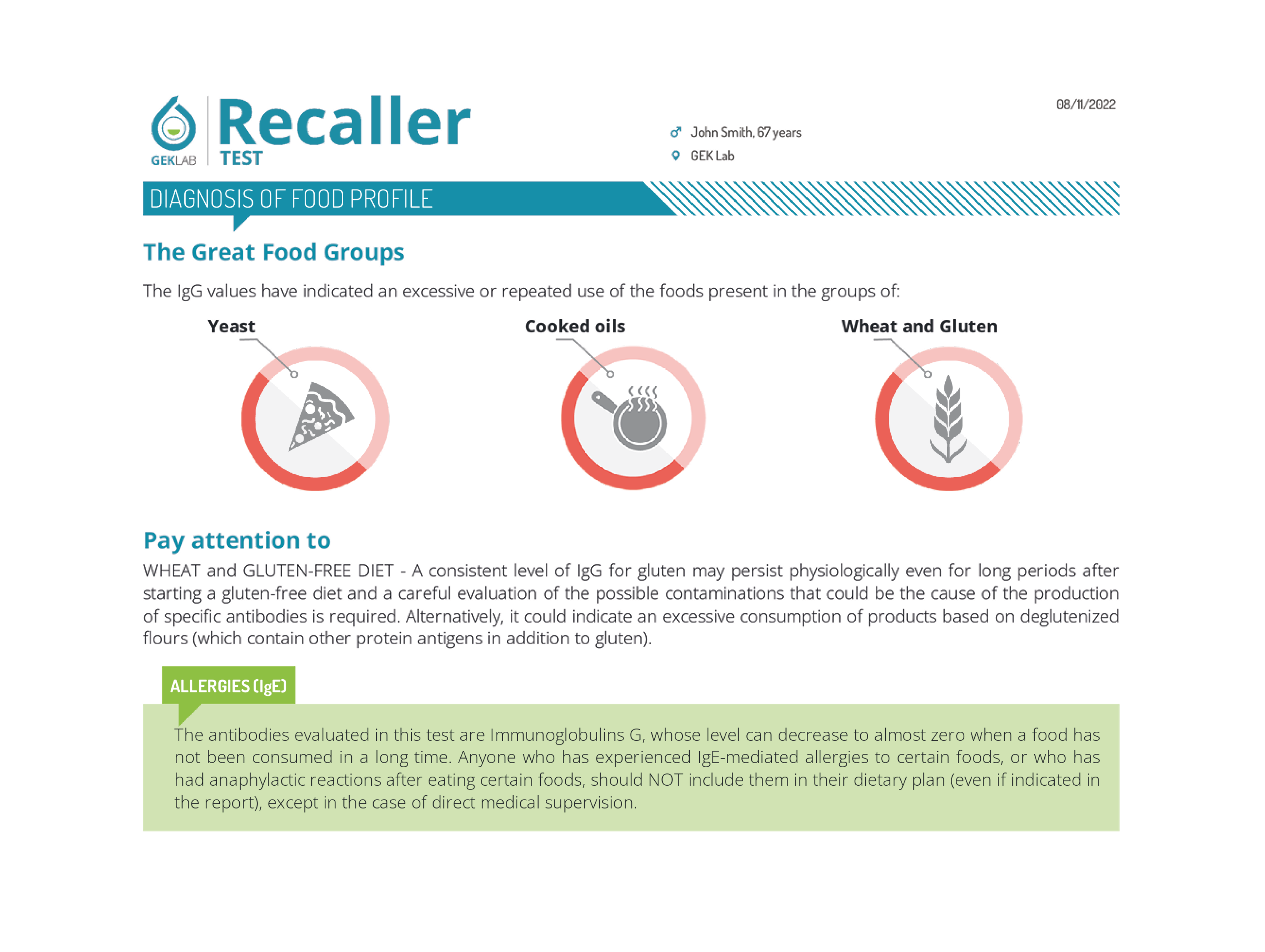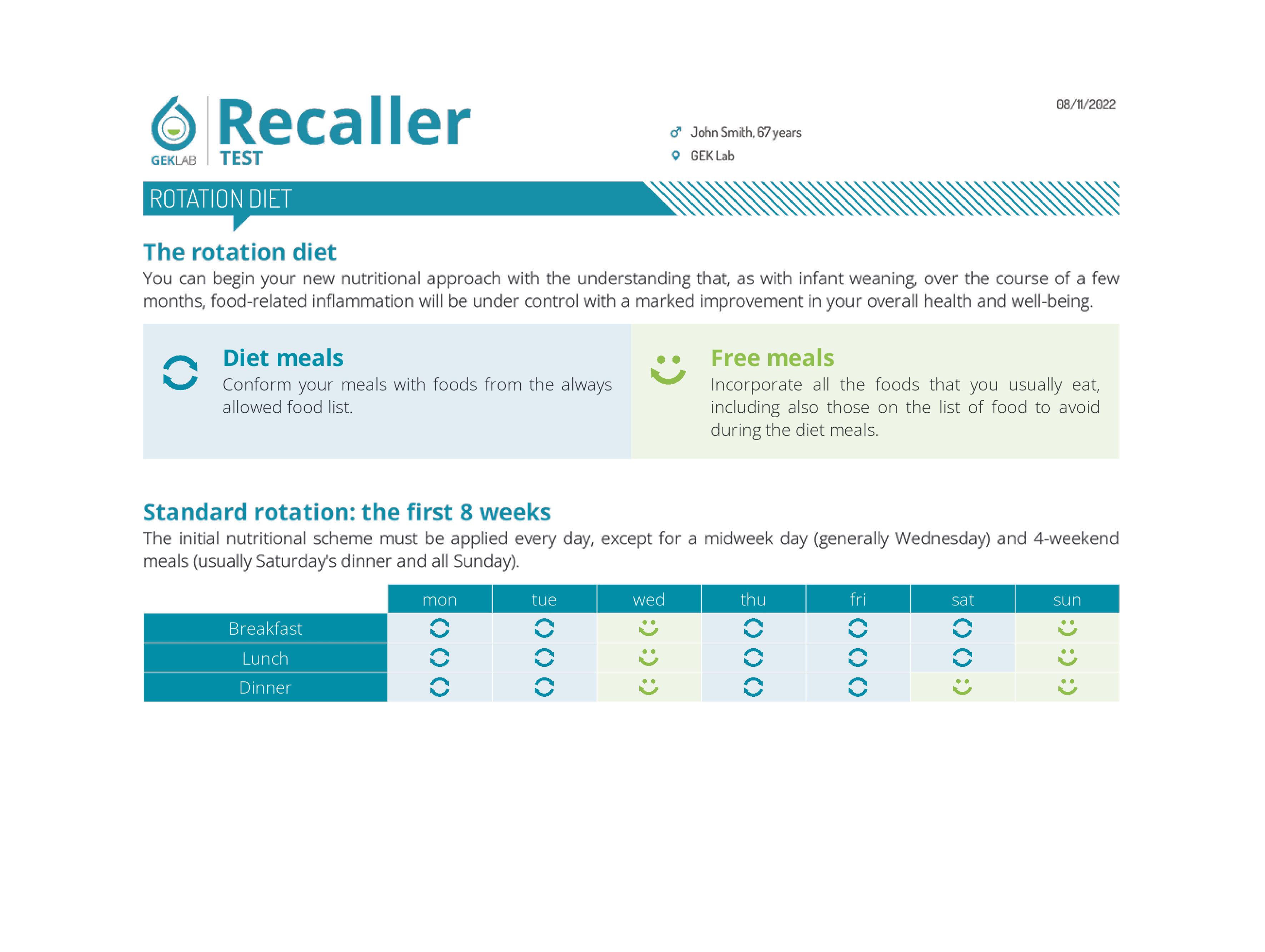
Recaller Test helps you understand if you are consuming specific foods in excess by measuring the inflammation in your body and interpreting the possible presence of mutations in the TNFSF13B gene linked to the development of food-related inflammation.
Based on the results, the doctors and specialists at GEK Lab, experts in precision medicine, will suggest a personalized nutritional and integrative path for you.
Also available at GEK Lab locations

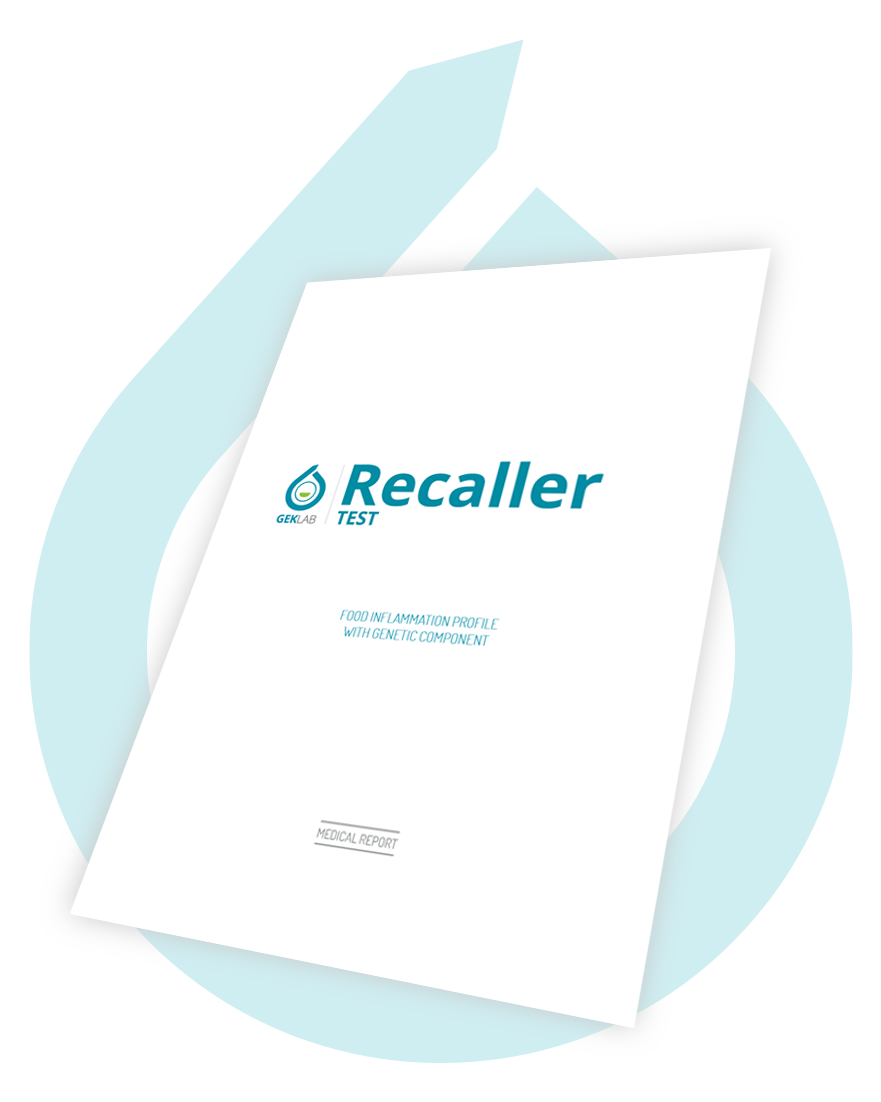
What do I get from my Recaller Test?
- A medical diagnosis based on laboratory data interpretation
- Measurement of your inflammatory levels (BAFF and PAF), also correlated with daily food intake (food-related inflammation).
- Identification of the Personal Food Profile that allows nutritional personalization through a rotation diet of the Major Food Groups.
- Evaluation of any genetic polymorphisms that characterize a greater personal susceptibility to the development of autoimmune diseases.
- 6 months of free access to the MyGEK Lab service, a scientific consulting service that provides a collection of frequently asked questions and direct contact with a team of nutritionists.
- Personalized integrative advice: what are the useful active principles to counteract your oxidation levels detected by the test.

The Test Recaller addresses the following aspects


FAQ
Disorders such as bloating, heaviness, flatulence, and digestive issues are often due to an inflammatory condition related to food, particularly individual excessive or repeated intake. Knowing which Food Groups are related to inflammation allows rotating foods during the week, without resorting to dangerous elimination diets, and regaining well-being and a physiological relationship with food.
No, it’s false! Once celiac disease has been ruled out, eliminating gluten from your diet is not only senseless but also very dangerous because it can lead to serious nutritional deficiencies. Furthermore, such a selective diet, in the absence of pathology, can lead to an automatic increase in the consumption of other foods. For example, substituting pasta with rice, its chronic use will then lead to the appearance of the same symptoms but with the intake of the new food, as the problem is not gluten or rice per se, but the individually excessive or repeated manner in which they are consumed. Understanding scientifically which are the major food groups to modulate (and not to eliminate) during the week allows maintaining a varied diet and recovering a physiological condition with all foods, including gluten.
Yes! Having eliminated gluten from your diet does not exclude that the daily repetition over time of other foods may lead to symptoms and disturbances. In the presence of celiac disease, to compensate for the absence of bread, pasta, and traditional bakery products in the diet, gluten-free products are consumed, which, even if of quality, can be consumed in excess. Knowing the Food Groups causing food inflammation, it is possible to scientifically modulate their intake during the week, without ever eliminating them. This will allow you to maintain a varied diet while concretely improving your well-being.
The symptoms of food inflammation are often those that most commonly affect the intestine and stomach, such as bloating, heaviness, digestive difficulties, diarrhea, constipation, and gastrointestinal pain. However, some symptoms are not immediately correlated with food intake. This is because chronic low-grade inflammation, even induced by diet, can disrupt the physiological balance of all systems and organs, causing, for example, insulin resistance (and therefore a greater tendency to gain weight), reduced physical and mental performance, chronic headaches, appearance of canker sores, recurrent cystitis, and candidiasis, as well as fragile skin and hair, fragile bones, and weakening of the immune system. Measuring food inflammation scientifically allows for the establishment of a personalized diet capable of addressing chronic low-grade inflammation and consequently the associated symptoms.
There are several pathologies correlated with food inflammation. Some are more easily attributable to food, such as irritable bowel syndrome (IBS), gastroesophageal reflux, and gastrointestinal disorders in general. However, conditions such as osteoporosis, insulin resistance, obesity, thyroiditis, and autoimmune diseases are also strongly influenced by chronic low-grade inflammation, which can be related to diet. Some molecular mechanisms involve the B-Cell activating Factor (BAFF), an inflammatory cytokine measured by the Recaller Test. If elevated, BAFF can lead to alterations in bone metabolism, glucose metabolism, and hormonal balance, even due to improper diet.
Difficulty in losing weight, as well as already manifest obesity, is closely linked to inflammation. BAFF, an inflammatory cytokine analyzed through the Recaller Test, can induce insulin resistance, disrupting normal metabolism and promoting the accumulation of energy in the form of adipose tissue. Additionally, adipose tissue itself can produce inflammatory molecules, further worsening the overall situation. Intervening through a personalized anti-inflammatory diet is a positive step towards body recomposition, improving metabolism. Thus, weight-related challenges can be addressed more effectively, leading to overall improvement in health.
Frequent headaches are related to persistent inflammation of nervous tissues, also caused by chronic or excessive food intake. Personalized dietary management, with an assessment of Great Food Groups, consumed in excess, allows for modulation of migraine episodes and chronic headaches.
Some foods, like milk, can be the “last straw” in situations of chronic inflammation. Intestinal disorders may result from inflammatory responses unrelated to lactose intolerance (which is a sugar), but fueled by an immunological reaction to milk proteins. They are often also determined by excessive consumption of foods belonging to the Milk group (and unsuspecting ones, like beef), or that lead to increased inflammation responsible for various disorders, including intestinal ones. Identifying these foods accurately is the first strategy to promote a varied diet and regain a physiological relationship with food. With the Recaller Test, you’ll have the tools to restore your well-being.
Inflammation is often involved in the difficulty in increasing body weight. The Recaller Test allows reducing inflammation, improving digestive functions, and nutrient absorption through a personalized diet.
There are no individual foods (such as bread, cheese, or others) that trigger symptoms like candida. However, the presence of food-related inflammation linked to excessive consumption of major food groups can be one of the causes of the disorder, altering intestinal and vaginal microflora. Modulating the consumption of specific foods in a healthy and varied diet facilitates the restoration of bacterial flora and promotes well-being.
Swelling, especially if it occurs upon waking and involves hands and ankles, can be associated with water retention issues and, consequently, inflammation. Very often, a diet that is excessively repetitive over time is one of the main causes of inflammation. Measuring levels of low-grade systemic inflammation through BAFF and PAF analytes, along with identifying major food groups consumed in excess, allows for adopting a dietary rotation that reduces inflammation. Inflammation is a condition that tends to promote fluid retention; controlling such processes allows for expelling excess fluids and reducing swelling.
The inflammatory response is not dependent on individual foods, but on excessive consumption of food groups similarly recognized by the immune system. Research and statistical studies have identified major food groups such as Wheat and gluten, Dairy, Yeast and fermented substances, Nickel, and Cooked oils, which, if consumed in excess, can trigger or perpetuate persistent inflammation. The importance of identification lies not in individual substances, as no food is inherently “enemy”, but in the daily repetition of the same dietary stimulus that can generate inflammation.
The Recaller Test does not analyze individual foods but rather eleven recombinant proteins that allow for identifying food inflammation towards major food groups. Many people mistakenly believe that the more foods are analyzed, the more accurate the result. In reality, evaluating IgG reactions to individual foods and their consequent elimination, besides being very dangerous, is entirely devoid of scientific validity.
The only intolerances recognized by the scientific community are celiac disease, also known as gluten intolerance, and lactose intolerance, both irreversible and not evaluated by the Recaller Test. Commercial tests that assess “food intolerances” other than celiac disease or lactose intolerance lack scientific basis. The Recaller Test is different; it evaluates food inflammation based on solid scientific research.
No, the Recaller Test does not aim to identify foods to eliminate from the diet. On the contrary, the test aims to identify major food groups that, if consumed systematically or repeatedly, could cause inflammatory responses in the body. The recommended management of food inflammation involves adopting a rotational diet, not elimination. The personalized nutritional protocol resulting from the Recaller Test focuses on food rotation, allowing the body to maintain a physiological relationship with all foods while controlling inflammatory responses, without resorting to elimination diets.
No, the Recaller Test is not designed to assess celiac disease or lactose intolerance. Its main purpose is to identify food inflammation, a condition different from lactose enzyme intolerance, caused by a lack of an enzyme for lactose digestion, and celiac disease, an autoimmune condition that requires complete exclusion of gluten from the diet. It is important to note that sometimes symptoms related to food inflammation and those of actual intolerances may coexist, so it is advisable to report if you suffer from one of these two intolerances at the time of the test. Controlling inflammation through a rotational diet allows addressing various disorders associated with low-grade systemic inflammation, even in the presence of already known intolerances.
Within the Recaller Test medical report, based on the inflammation levels detected, a personalized dietary plan is defined, following the principles of rotational dieting. The rotational diet involves abstaining from the identified Major Food Groups on certain days of the week and having free days where it is important to consume foods from these groups. In the report, you can find all the alternatives to rotate foods and menu ideas for diet days.
Yes, the Recaller Test can provide useful information for those suffering from autoimmune conditions. Autoimmune diseases involve inflammatory, metabolic, environmental, and genetic aspects, and the scientific progress of the last 30 years has highlighted the key role of low-grade inflammation and immunological activation in such pathologies. Scientific studies confirm the importance of BAFF in autoimmune diseases, opening new perspectives for diagnosis and therapy also related to nutrition.



Find the Perfect Test for You
Choose the test that best suits your needs by answering the questions in our personalized questionnaire. Your health is unique, and we want to provide you with a tailor-made journey. Answer now and discover which GEK test is the right choice for you.

Simple and Reliable
Purchase the test online or at an authorized GEK Lab center. Our method is simple and fast: a straightforward capillary sample will be analyzed in our laboratory and reported by our experienced medical team. Discover the convenience of taking care of your health with GEK Lab.

Your Report at the Click of a Button
Receive your personalized medical report at the authorized GEK Lab center or download it directly through our MyGEKLab service. Access securely and quickly to keep your health under control at all times. With GEK Lab, your wellness journey is more accessible than ever.

Invest in Your Health
Put the recommendations of the report into practice to invest in your health and regain your ideal shape. Discover how to adopt a dietary style that promotes well-being, recognizing the positive effects on your body. Our nutritional counseling service, MyGEKLab, is at your disposal for any questions: Your well-being is our priority.


